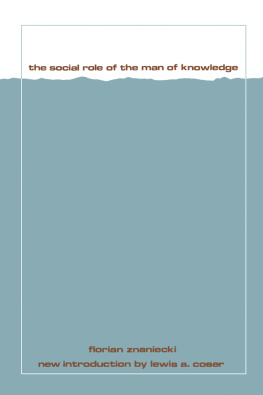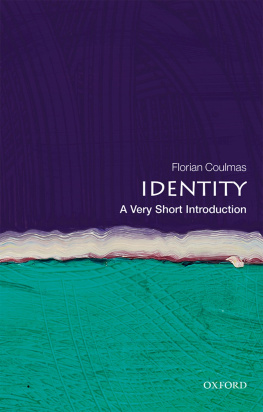Florian Znaniecki - The Social Role of the Man of Knowledge
Here you can read online Florian Znaniecki - The Social Role of the Man of Knowledge full text of the book (entire story) in english for free. Download pdf and epub, get meaning, cover and reviews about this ebook. year: 2020, publisher: Taylor & Francis, genre: Science. Description of the work, (preface) as well as reviews are available. Best literature library LitArk.com created for fans of good reading and offers a wide selection of genres:
Romance novel
Science fiction
Adventure
Detective
Science
History
Home and family
Prose
Art
Politics
Computer
Non-fiction
Religion
Business
Children
Humor
Choose a favorite category and find really read worthwhile books. Enjoy immersion in the world of imagination, feel the emotions of the characters or learn something new for yourself, make an fascinating discovery.
- Book:The Social Role of the Man of Knowledge
- Author:
- Publisher:Taylor & Francis
- Genre:
- Year:2020
- Rating:5 / 5
- Favourites:Add to favourites
- Your mark:
- 100
- 1
- 2
- 3
- 4
- 5
The Social Role of the Man of Knowledge: summary, description and annotation
We offer to read an annotation, description, summary or preface (depends on what the author of the book "The Social Role of the Man of Knowledge" wrote himself). If you haven't found the necessary information about the book — write in the comments, we will try to find it.
The Social Role of the Man of Knowledge — read online for free the complete book (whole text) full work
Below is the text of the book, divided by pages. System saving the place of the last page read, allows you to conveniently read the book "The Social Role of the Man of Knowledge" online for free, without having to search again every time where you left off. Put a bookmark, and you can go to the page where you finished reading at any time.
Font size:
Interval:
Bookmark:

2 Park Square, Milton Park, Abingdon, Oxon OX14 4RN
52 Vanderbilt Avenue, New York, NY 10017
New material this edition copyright 1986 by Lewis A. Coser
Product or corporate names may be trademarks or registered trademarks, and are used only for identification and explanation without intent to infringe.
3. Social psychology. 4. Knowledge, Sociology of.
I. Title II. Series.
HM213.Z6 1986 301 85-24586
ISBN 0-88738-642-3 (pbk.)
ISBN 13: 978-1-138-53863-4 (hbk)
Font size:
Interval:
Bookmark:
Similar books «The Social Role of the Man of Knowledge»
Look at similar books to The Social Role of the Man of Knowledge. We have selected literature similar in name and meaning in the hope of providing readers with more options to find new, interesting, not yet read works.
Discussion, reviews of the book The Social Role of the Man of Knowledge and just readers' own opinions. Leave your comments, write what you think about the work, its meaning or the main characters. Specify what exactly you liked and what you didn't like, and why you think so.











